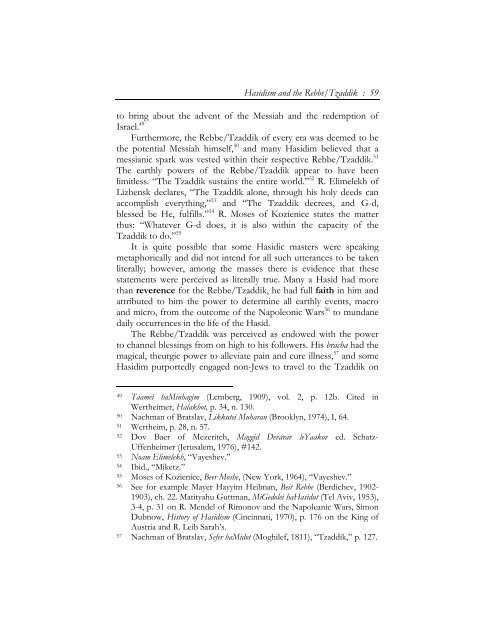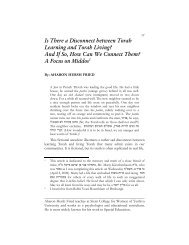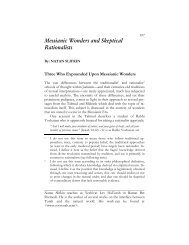Hasidism and the Rebbe/Tzaddik: The Power and Peril of ... - Hakirah
Hasidism and the Rebbe/Tzaddik: The Power and Peril of ... - Hakirah
Hasidism and the Rebbe/Tzaddik: The Power and Peril of ... - Hakirah
Create successful ePaper yourself
Turn your PDF publications into a flip-book with our unique Google optimized e-Paper software.
<strong>Hasidism</strong> <strong>and</strong> <strong>the</strong> <strong>Rebbe</strong>/<strong>Tzaddik</strong> : 59<br />
to bring about <strong>the</strong> advent <strong>of</strong> <strong>the</strong> Messiah <strong>and</strong> <strong>the</strong> redemption <strong>of</strong><br />
Israel. 49<br />
Fur<strong>the</strong>rmore, <strong>the</strong> <strong>Rebbe</strong>/<strong>Tzaddik</strong> <strong>of</strong> every era was deemed to be<br />
<strong>the</strong> potential Messiah himself, 50 <strong>and</strong> many Hasidim believed that a<br />
messianic spark was vested within <strong>the</strong>ir respective <strong>Rebbe</strong>/<strong>Tzaddik</strong>. 51<br />
<strong>The</strong> earthly powers <strong>of</strong> <strong>the</strong> <strong>Rebbe</strong>/<strong>Tzaddik</strong> appear to have been<br />
limitless. “<strong>The</strong> <strong>Tzaddik</strong> sustains <strong>the</strong> entire world.” 52 R. Elimelekh <strong>of</strong><br />
Lizhensk declares, “<strong>The</strong> <strong>Tzaddik</strong> alone, through his holy deeds can<br />
accomplish everything,” 53 <strong>and</strong> “<strong>The</strong> <strong>Tzaddik</strong> decrees, <strong>and</strong> G-d,<br />
blessed be He, fulfills.” 54 R. Moses <strong>of</strong> Kozienice states <strong>the</strong> matter<br />
thus: “Whatever G-d does, it is also within <strong>the</strong> capacity <strong>of</strong> <strong>the</strong><br />
<strong>Tzaddik</strong> to do.” 55<br />
It is quite possible that some Hasidic masters were speaking<br />
metaphorically <strong>and</strong> did not intend for all such utterances to be taken<br />
literally; however, among <strong>the</strong> masses <strong>the</strong>re is evidence that <strong>the</strong>se<br />
statements were perceived as literally true. Many a Hasid had more<br />
than reverence for <strong>the</strong> <strong>Rebbe</strong>/<strong>Tzaddik</strong>, he had full faith in him <strong>and</strong><br />
attributed to him <strong>the</strong> power to determine all earthly events, macro<br />
<strong>and</strong> micro, from <strong>the</strong> outcome <strong>of</strong> <strong>the</strong> Napoleonic Wars 56 to mundane<br />
daily occurrences in <strong>the</strong> life <strong>of</strong> <strong>the</strong> Hasid.<br />
<strong>The</strong> <strong>Rebbe</strong>/<strong>Tzaddik</strong> was perceived as endowed with <strong>the</strong> power<br />
to channel blessings from on high to his followers. His bracha had <strong>the</strong><br />
magical, <strong>the</strong>urgic power to alleviate pain <strong>and</strong> cure illness, 57 <strong>and</strong> some<br />
Hasidim purportedly engaged non-Jews to travel to <strong>the</strong> <strong>Tzaddik</strong> on<br />
49 Taamei haMinhagim (Lemberg, 1909), vol. 2, p. 12b. Cited in<br />
Wer<strong>the</strong>imer, Halakhot, p. 34, n. 130.<br />
50 Nachman <strong>of</strong> Bratslav, Likkutei Muharan (Brooklyn, 1974), I, 64.<br />
51 Wer<strong>the</strong>im, p. 28, n. 57.<br />
52 Dov Baer <strong>of</strong> Mezeritch, Maggid Devarav leYaakov ed. Schatz-<br />
Uffenheimer (Jerusalem, 1976), #142.<br />
53 Noam Elimelekh, “Vayeshev.”<br />
54 Ibid., “Miketz.”<br />
55 Moses <strong>of</strong> Kozienice, Beer Moshe, (New York, 1964), “Vayeshev.”<br />
56 See for example Mayer Hayyim Heilman, Beit <strong>Rebbe</strong> (Berdichev, 1902-<br />
1903), ch. 22. Matityahu Guttman, MiGedolei haHasidut (Tel Aviv, 1953),<br />
3-4, p. 31 on R. Mendel <strong>of</strong> Rimonov <strong>and</strong> <strong>the</strong> Napoleanic Wars, Simon<br />
Dubnow, History <strong>of</strong> <strong>Hasidism</strong> (Cincinnati, 1970), p. 176 on <strong>the</strong> King <strong>of</strong><br />
Austria <strong>and</strong> R. Leib Sarah’s.<br />
57 Nachman <strong>of</strong> Bratslav, Sefer haMidot (Moghilef, 1811), “<strong>Tzaddik</strong>,” p. 127.

















